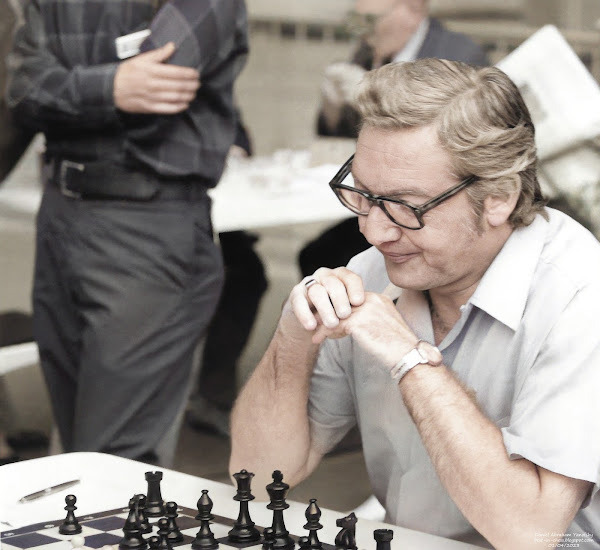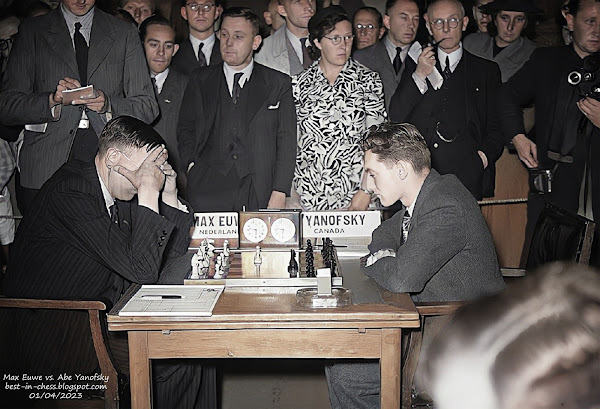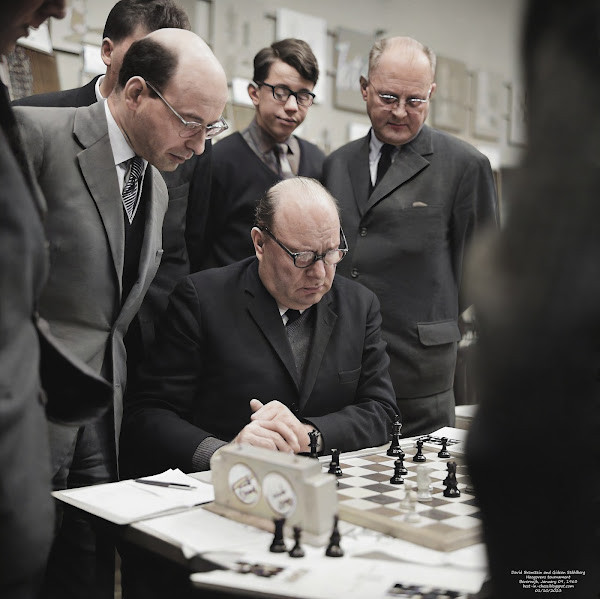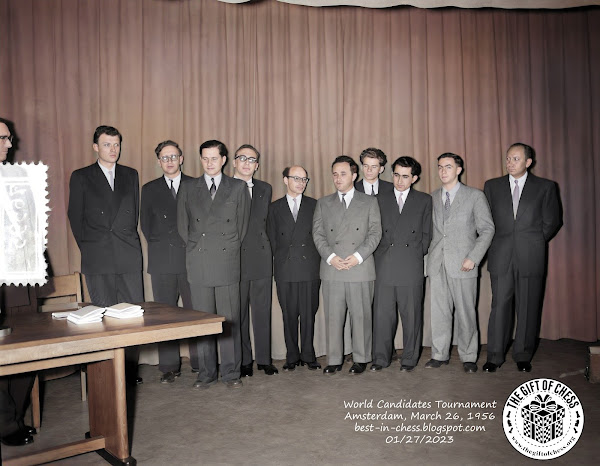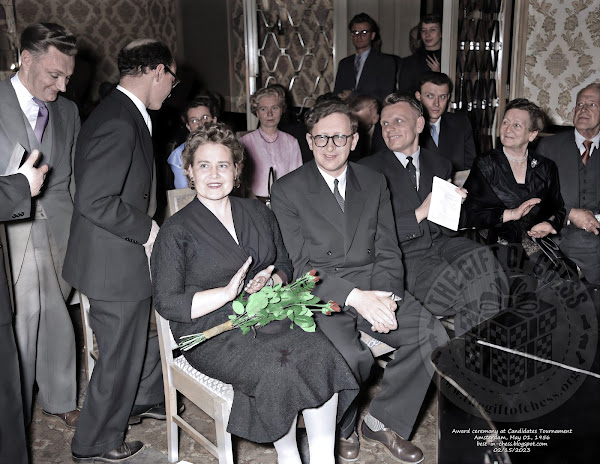Back to Home Index
December 08 2006
National Post, Toronto, Ontario, Canada, Friday, December 08, 2006
Chess grandmaster never won world championship
David Bronstein, who died on Tuesday, aged 82, was a leading Soviet chess grandmaster and writer. Like Viktor Korchnoi, he was often described as the greatest player never to have won a world championship.
Bronstein's first international tournament success occurred at the Satsjobaden Interzonal of 1948, when he qualified for the first Candidates' Tournament of 1950 in Budapest. He went on to win the title over Isaac Boleslavsky (whose daughter, Tatiana, he later married) and, the following year, entered the world title challenge match.
He came agonizingly close to his goal when he tied the match (12-12) with Mikhail Botvinnik, the reigning champion. Under World Chess Federation rules, however, the title remained with the holder and Bronstein never came so close again.
It was rumoured that Bronstein, a Ukrainian, was forced to throw the match by the Soviet authorities to allow the Russian Botvinnik to win. Bronstein had been the stronger player until the final stages of the tournament, when he played feebly in the 23 rd and penultimate game, throwing away his chances of victory. In his book The Sorcerer's Apprentice (1995, co-written with Tom Furstenberg), Bronstein wrote: “The only thing I am prepared to say about all this controversy is that I was subjected to strong psychological pressure from various sources and it was entirely up to me to yield to that pressure or not. Let's leave it at that.”
Bronstein's game demonstrated a high degree of creativity and tactical verve. He introduced many new ideas into the King's Indian Defence and King's Gambit. His theoretical work on the King's Indian Defence is reflected in his book Bronstein on the King's Indian (1999). He was one of the originators of Rapid Chess, played at a faster time limit (with 30 minutes or less for the game) and developed a form of Random Chess well before Bobby Fischer claimed ownership of the concept. In Bronstein Random Chess, the pawns are set out and the first eight moves involve placing the pieces on the vacant back rank. Bronstein's serious manner was belied by a ready smile. He was held in particular affection among chess cognoscenti for his unaffected love of the game and his commitment to explaining its higher mysteries to the average player. Interviewers would be treated to a torrent of chess stories, reminiscences, philosophical speculations about the game, ideas and analysis, all dispensed with undiminished enthusiasm and charm.
In a series of books (most notably in Zurich International Chess Tournament 1953), Bronstein sought to explain in simple terms the elements of strategy. Rather than burden the reader with pages of turgid analysis of all possibilities, he aimed to amplify the ideas behind the players' moves.
A second cousin to Leon Trotsky, David Ionovich Bronstein was born on Feb. 19, 1924, at Bila Tserkva, near Kyiv, in Ukraine. He was taught chess by his grandfather and began playing competitively at the age of six. His rise was meteoric. After he won a tournament for adults and juniors at Kyiv in 1938, he soon became one of the strongest young Soviet players in the period before the outbreak of the Second World War.
In 1941 he was ordered to leave Kyiv as a conscript in the Red Army, taking only the clothes he was wearing though he avoided being sent to a combat unit due to his poor eyesight. His mother left Kyiv immediately, fleeing the German army. When Bronstein returned home a couple of years later, he found the family home was empty. As relatives of Trotsky, his family were constantly under the eyes of the Secret Police and his father served seven years in the Gulag.
 David Bronstein 07 Dec 2006, Thu The Daily Telegraph (London, Greater London, England) Newspapers.com
David Bronstein 07 Dec 2006, Thu The Daily Telegraph (London, Greater London, England) Newspapers.com
Bronstein came to the notice of the chess world when, aged 20, he inflicted a defeat on Mikhail Botvinnik in the 1944 Soviet championship. Bronstein twice shared the championship, in 1948 with Alexander Kotov and the next year with Vasily Smyslov. After his world championship match in 1951, Bronstein represented the Soviet Union at the Olympiads of 1952, 1954, 1956 and 1958, winning gold medals in all of them. He played in the Candidates' Tournament in Zurich in 1953, when there was again speculation that he, along with other non-Russian Soviets, had been “persuaded” to allow Smyslov to win.
The following year, after tying for first and second places with the British chess player Hugh Alexander at the Hastings International Chess Congress, Bronstein was singled out for criticism in Moscow's Literary Gazette in an article which accused him and other Soviet players of “complacency and self-conceit” which had robbed the nation of big honours in international tournaments.
Away from their rivalry over the chess board, the difficulties of life in the Soviet Union generated a strong sense of camaraderie among many of the leading players. During an exhibition match, Bronstein recalled how he and Smyslov had agreed to a draw in 12 moves. A chess official protested, pointing out that, after all, the Soviet Chess Federation was paying them. “Do you really believe that I will attack Smyslov for only three rubles a day?” Bronstein retorted.
The Soviet authorities allowed Bronstein to travel abroad until 1976, when he refused to sign a letter condemning the defection of Viktor Korchnoi. This was the most difficult period of his life and coincided with a bout of cancer, which he successfully fought off. Bronstein remained confined behind the Iron Curtain until the collapse of Communism in 1989.
During the 1990s, Bronstein toured the world giving displays and lectures. An American chess fan who saw him at an exhibition match at Long Beach, noted that he played modestly and deliberately, tailoring his game to the level of his opponents, playing “waiting moves” where necessary and making the odd sacrifice, not wanting to gratify his ego with easy victories.
The Daily Telegraph.











